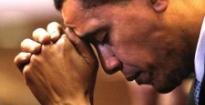Obama's Stimulus Funds Faith-Based Groups
 Politico reports:
Politico reports:
The stimulus bought Castleton United Methodist Church in Indianapolis a new heating and cooling system. In Laramie, Wyo., it bought the Church of St. Laurence O'Toole new windows for the Roman Catholic school it runs. And in Harrisburg, Pa., Christian Churches United of the Tri-County Area spent its $120,000 in stimulus funding on food and shelter for local homeless people.
"It kind of fell from the sky, and it was unbelievable that we had this much extra money," said Jackie Rucker, executive director of the church-sponsored nonprofit in Pennsylvania’s capital.
For many conservatives, the $787 billion strong>American Recovery and Reinvestment Act,< as the stimulus is formally known, has been Exhibit A in their case against the Obama administration, a symbol for an era they feel will be defined by out-of-control government spending. (See: strong>Biden: 'Recovery Act is working'<)
But the strong>stimulus< is also the largest-scale embodiment of what was, not long ago, a conservative priority: directing tax dollars to "faith-based initiatives," as President strong>George W. Bush< called them. (See: strong>Obama to rename Bush's faith office)<
The story of the strong>Obama< administration's large-scale spending on faith-based groups has been largely untold, perhaps because it cuts so sharply across the moment's intensely partisan narrative. And in fact, when the stimulus was being debated in February 2009, conservatives attacked the bill as "anti-religious" in its spending guidelines. (See: strong>Mixed W.H. signals on stimulus<)
But an analysis by POLITICO found that at least $140 million in stimulus money has gone to faith-based groups, the result of an unpublicized White House decision to spend government money, where legal, supporting religiously inspired nonprofit groups. And that decision was just the beginning.
In an aggressive attempt at outreach, federal agencies, in conference calls and online seminars, instructed faith-based groups on how to apply for the grants, and federal officials sometimes stepped in when the state officials who distribute the money were reluctant to spend it on groups associated with churches and other religious establishments.
"Part of our job is to ensure that there's a level playing field — we don't encourage anyone to favor faith-based groups over other organizations, but we do want to ensure that there's no discrimination against faith-based organizations," said Joshua DuBois, who heads the White House Office of Faith-Based and Neighborhood Partnerships, which Bush created and President Barack Obama renamed and expanded. (See: strong>The Obama generation<)
"Federal agencies did make a point to remind people that faith-based and community organizations were eligible for some of this funding," he said.
The early criticism of the stimulus on religious grounds focused on boilerplate language that limited how religious universities and institutions could use some funds administered by the Department of Education. "You would think the ACLU drafted this bill," wrote strong>Mike Huckabee< in an e-mail to supporters in 2009, while Sen. strong>Jim DeMint< (R-S.C.) called it "a direct attack on students of faith."
But the language that drew complaints applied only to a small fraction of stimulus spending. Meanwhile, some elements of the program — notably, Energy Department grants that can be used to refurbish religious sanctuaries — have drawn criticism from groups concerned that it encourages spending that crosses the line between the religious and the secular.
"We believe that the heating and cooling of religious institutions is a job for the congregation, not the American taxpayer," Barry Lynn, executive director of Americans United for Separation of Church and State, told POLITICO.

